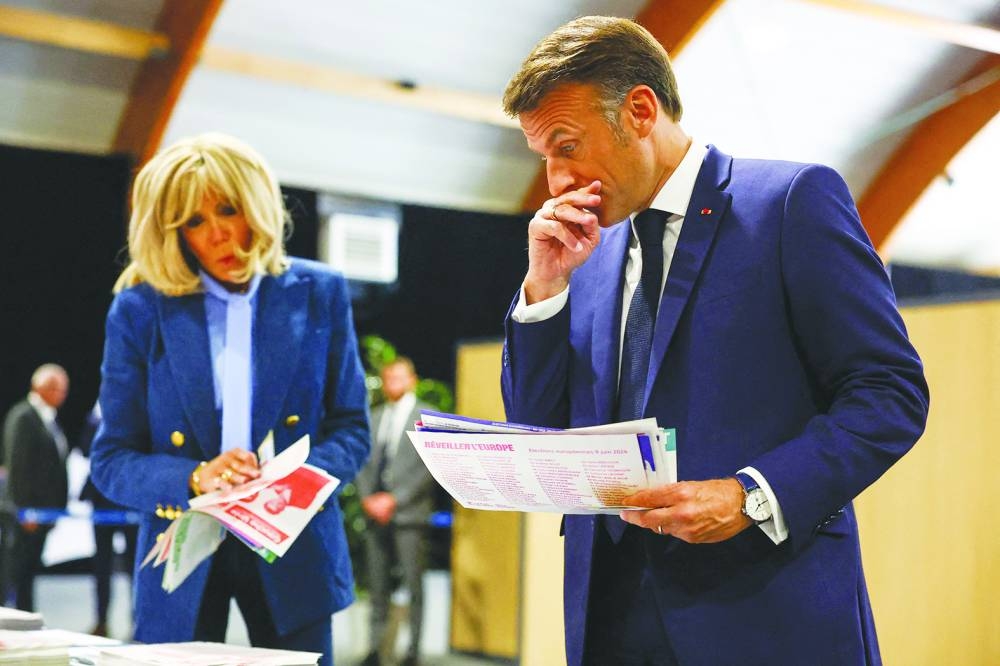French President Emmanuel Macron set off a political earthquake on Sunday when he called shock legislative elections for later this month after he was trounced in the European Union vote by Marine Le Pen’s far-right party.
Macron’s surprise decision represents a major roll of the dice on his political future, three years before his presidency ends. If Le Pen’s National Rally (RN) party wins a parliamentary majority, Macron would be left without a say in domestic affairs.
Macron said the EU results were grim for his government, and one he could not pretend to ignore. In an address to the nation, less than two months before Paris hosts the Olympics, he said lower house elections would be called for June 30, with a second-round vote on July 7.
“This is an essential time for clarification,” Macron said. “I have heard your message, your concerns and I will not leave them unanswered...France needs a clear majority to act in serenity and harmony.”
Led by telegenic 28-year-old Jordan Bardella, the RN won about 32% of the vote in Sunday’s vote, more than double the Macron ticket’s 15%, according to the first exit polls. The Socialists came within a whisker of Macron, with 14%.
Le Pen, the frontrunner for the 2027 election in which Macron is unable to stand, welcomed the president’s decision.
“We are ready to take over power if the French give us their trust in the upcoming national elections,” she said at a rally.
Macron’s advisers said the president made his decision after this week’s 80th anniversary of the D-Day landings in Normandy, when he met people out and about who said they were tired of endless political infighting in parliament.
Le Pen and Bardella sought to frame the EU election as a mid-term referendum on Macron’s mandate, tapping into discontent with immigration, crime and a two-year inflation crisis.
Le Pen’s strong showing, notching a 10-point increase on the last EU election in 2019, will weaken Macron’s hold on power three years before the end of his final term. It could also prompt high-level defections from his centrist camp as the succession battle to replace him heats up.
In a victory speech to a rapturous audience at party headquarters, Bardella urged Macron to call for a new legislative election, although the president is under no obligation to follow suit.
“Emmanuel Macron is this evening a weakened president,” he said.
“The president cannot remain deaf to the message sent by the French tonight.”
With widespread expectations of a bruising loss, interestingly government officials sought to downplay the importance of the European poll, pledging to maintain policy focus and arguing that EU elections are a poor predictor of presidential voting.
But the symbolism of the loss is significant, and could have real implications.
Le Pen may be able to lure conservative rebels to a party with a clear sense of momentum that looks increasingly well-placed for the 2027 election, albeit three years out.
Macron’s defeat also fires the starting gun on his succession battle.
Several big names, such as former prime minister Edouard Philippe, the current one, Gabriel Attal, and Finance Minister Bruno Le Maire are all eager to take the top job, political sources say. However, an April poll by Le Figaro showed Le Pen beating both Attal and Philippe in the 2027 vote.
“The results also prompt a more existential question about the future of Macron’s party once he leaves office,” Eurointelligence analysts wrote in a note. “Will it fragment or find a new leader to unite behind?”
Philippe’s fledgling new party, Horizons, which is currently sitting with Macron’s Renaissance in parliament, will hold a meeting of its political bureau today, an aide told Reuters, to plot its next moves.
Sunday’s results also saw the resurgence of the French centre-left, with Socialist candidate Raphael Glucksmann, a pro-Ukraine moderate, who won some 14%. His strong showing will embolden the Socialists, who had faced electoral oblivion after Macron’s 2017 election win.
On the European front, Macron’s score, coupled with the collapse of his Spanish and Dutch allies, means his mainstream liberal Renew grouping was amongst the biggest losers in the European parliament, reducing his influence in Brussels.

French President Emmanuel Macron (right) and his wife Brigitte Macron secure ballots before their vote for the European Parliament election at a polling station in Le Touquet, northern France, on Sunday. (AFP)
